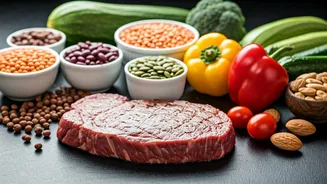Protein: The Basics
Protein is an essential nutrient, forming the building blocks for muscles, bones, skin, and organs. It's composed of amino acids, which are crucial for numerous
bodily functions, including enzyme production and immune system support. Protein's impact on satiety also plays a key role in weight management. Understanding the function of protein is the first step toward optimizing your diet. The body doesn't store protein like it stores fats and carbohydrates, which means a regular supply through diet is necessary. The amount of protein a person needs can vary widely based on individual factors like activity level, overall health, and specific goals. Ensuring you get enough protein is vital for overall health and well-being, while excessive intake can lead to certain risks.
Calculating Your Needs
The recommended daily allowance (RDA) for protein varies. For adults, the general guideline is 0.8 grams of protein per kilogram of body weight. For example, if someone weighs 70 kilograms (approximately 154 pounds), they would need about 56 grams of protein per day. However, this is a broad estimate. Athletes and people with very active lifestyles or those looking to build muscle may need significantly more protein. Pregnant or breastfeeding women also have elevated protein requirements. It's worth considering your individual needs based on your physical activity, health goals, and any medical conditions. To calculate your needs, consider consulting a healthcare professional or a registered dietitian who can provide personalized guidance.
Potential Risks: Excessive Protein
While protein is vital, consuming too much can lead to some health issues. One concern is the strain on kidneys. The kidneys are responsible for filtering waste products from the breakdown of protein, so a high protein intake can overwork them. Another potential risk is dehydration. When the body processes high amounts of protein, it produces more urea, which must be eliminated through urine, increasing fluid loss. Moreover, excessive protein intake can contribute to weight gain if it results in consuming more calories than you burn. High protein diets may also displace other important nutrients like carbohydrates, which are necessary for energy, and fiber. Monitoring your intake, staying hydrated, and being mindful of overall calorie consumption are all key considerations.
Sources of Protein
Protein is found in various food sources. Animal-based sources, such as meat, poultry, fish, eggs, and dairy products, are considered complete proteins, meaning they contain all nine essential amino acids. For vegetarians and vegans, a balanced diet that includes plant-based proteins can provide all the amino acids needed. These include foods like legumes (beans, lentils), tofu, tempeh, quinoa, nuts, and seeds. Combining different plant-based protein sources can ensure you get a full spectrum of amino acids. Focusing on a variety of protein sources offers a broader range of nutrients, helping with overall health. Considering both the source and quality of the protein is essential in making informed dietary choices.
Optimizing Protein Intake
To optimize protein intake, start by assessing your individual needs based on your activity level and health goals. Plan your meals to include a protein source with each meal or snack. Ensure you're eating a variety of foods to get a balance of essential amino acids and nutrients. Pay attention to how your body feels. If you experience digestive issues, fatigue, or other concerning symptoms, consider reducing your protein intake and consulting with a healthcare professional. Incorporate protein-rich foods into a balanced diet that includes carbohydrates, healthy fats, fruits, and vegetables. Pay attention to portion sizes. Even healthy foods can lead to weight gain if consumed in excessive amounts. Seek professional guidance from a doctor or a registered dietitian to fine-tune your approach for optimal health.













